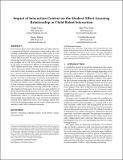Impact of Interaction Context on the Student Affect-Learning Relationship in Child-Robot Interaction
Author(s)
Chen, Huili; Park, Hae Won; Zhang, Xiajie; Breazeal, Cynthia
DownloadAccepted version (3.593Mb)
Open Access Policy
Open Access Policy
Creative Commons Attribution-Noncommercial-Share Alike
Terms of use
Metadata
Show full item recordAbstract
© 2020 Association for Computing Machinery. Prior work in affect-aware educational robots has often relied on a common belief that the relationship between student affect and learning is independent of agent behaviors (child's/robot's) or unidirectional (positive/negative but not both) throughout the entire student-robot interaction.We argue that the student affect-learning relationship should be interpreted in two contexts: (1) social learning paradigm and (2) sub-events within child-robot interaction. In our paper, we examine two different social learning paradigms where children interact with a robot that acts either as a tutor or a tutee. Sub-events within child-robot interaction are defined as task-related events occurring in specific phases of an interaction (e.g., when the child/robot gets a wrong answer). We examine subevents at a macro level (entire interaction) and a micro level (within specific sub-events). In this paper, we provide an in-depth correlation analysis of children's facial affect and vocabulary learning. We found that children's affective displays became more predictive of their vocabulary learning when children interacted with a tutee robot who did not scaffold their learning. Additionally, children's affect displayed during micro-level events was more predictive of their learning than during macro-level events. Last, we found that the affect-learning relationship is not unidirectional, but rather is modulated by context, i.e., several affective states facilitated student learning when displayed in some sub-events but inhibited learning when displayed in others. These findings indicate that both social learning paradigm and sub-events within interaction modulate student affect-learning relationship.
Date issued
2020Department
Massachusetts Institute of Technology. Media LaboratoryJournal
ACM/IEEE International Conference on Human-Robot Interaction
Publisher
ACM
Citation
Chen, Huili, Park, Hae Won, Zhang, Xiajie and Breazeal, Cynthia. 2020. "Impact of Interaction Context on the Student Affect-Learning Relationship in Child-Robot Interaction." ACM/IEEE International Conference on Human-Robot Interaction.
Version: Author's final manuscript